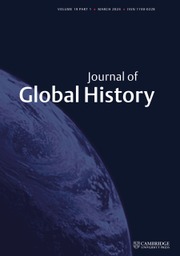Mission Statement
The Journal of Global History aims to be the leading scholarly outlet for innovative analyses of global historical phenomena. JGH publishes articles that examine structures, processes, actors, and theories of global change; and that study connections and disconnections on a trans-regional scale, or on smaller scales that nevertheless transcend the boundaries of individual polities or environments. JGH particularly values creativity and originality in approaches to global history, as well as debates on the theories, methods, and evidence underpinning global historical narratives.
JGH welcomes submissions examining historical actors, events, structures, and dynamics that have had significance beyond their immediate regional or temporal context, and that engage with and contribute to debates in global history. This may take a number of forms, including (but not limited to) studies of:
- Era-defining phenomena, such as the Anthropocene, the Neolithic revolution, early city states, the Black Death, (pre-)modern empires, world trade, slavery and abolition, industrialization, decolonization, the rise of global governance, or climate change;
- Local processes and events that engage with, and are relevant to our understanding of, broader debates of significance across time and space, such as issues of sovereignty, institution-building, political economy, ideology, gender, and identity;
- Actors and networks that have thought and/or operated across state and regional boundaries, and whose histories shed light on global themes such as demography, taxation, debt, justice, social welfare, race, class, sexuality, trade, migration, warfare, the environment, memory, knowledge, and rights;
- Globalisation and de-globalisation, including the tensions, inequities, crises, and conflicts enmeshed with evolving transnational, transcontinental and cross-cultural, political, social, economic, and material exchanges;
- Theories, methods, and practices in the writing of global history, including contributions that address and seek to overcome disciplinary problems and limitations.
JGH encourages original research that transcends traditional spatial or cultural units and engages with and seeks to define alternative frameworks of analysis. Global history extends beyond tracing the movement of people, goods, capital, ideas, and technology across borders: it also questions how the global affects the local and vice versa. Articles may assess the impact of global connections and structural entanglements. They may seek to reveal new forms of comparison. They may address alternative geographic arenas, such as the Eurasian steppe, the Saharan desert, or the Pacific, Atlantic, or Indian Oceanic worlds. JGH welcomes research rooted in area studies but whose arguments seek to move beyond local or regional paradigms. JGH also welcomes theoretical approaches in enhancing debate and opening up new perspectives. Last but not least, JGH is a forum not only for historians, but also for scholars working in other disciplines who wish to address an audiences in a format familiar to historical disciplinary conventions. We see value in the rapidly expanding availability of new datasets pieced together by scholars from other academic disciplines, for example, which can foster innovations in historiography or even overturn received views.
JGH primarily publishes articles drawing on extensive and original primary source research (defining the archive widely to include written, visual, and audio sources, as well as material culture), though it also publishes occasional historiographical review essays, as well as the debate-centred ‘Arenas in Global History’. All articles in JGH substantively engage with the literature on global history alongside more specialist scholarship.
JGH aims to make global history a diverse, representative, and truly ‘global’ field. It particularly welcomes submissions from scholars based in Asia, Africa and Latin America, and others whose perspectives on global history remain underrepresented in the mainstream. JGH also encourages diversity in gender, age, ethnicity, and academic experience. JGH is trialing a collaboration with development editors to help guide through the submission process scholars for whom English is not a first language; who study or work at universities outside of North America and Western Europe and where editing support is not readily available; and whose initial submissions and evidence base indicate a clear fit with JGH’s mission.
